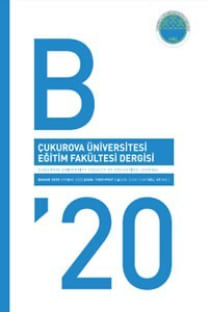Incorporating action research into in-service teacher education (INSET) programs
action research, teacher education, in-service teachers
___
Yigitoglu & Belcher, D. (2014) Baker, A. (2014). Exploring teachers' knowledge of second language pronunciation techniques: Teacher cognitions, observed classroom practices, and student perceptions. TESOL Quarterly, 48 (1), 136-163.Bartels, N. (2001). Professional preparation and action research: Only for language teachers? TESOL Quarterly, 36 (1), 71-78. Bausch, L. (2010). The power of teachers' writing stories: exploring multiple layers of reflective inquiry in writing process education. Journal of Language and Literacy Education, 6(1), 20-39.
Berger, J. G., Boles, K. C., Troen, V. (2005). Teacher research and school change: paradoxes, problems, and possibilities. Teaching and Teacher Education, 21, 93–105. Borg, S. (2001). Self-perception and practice in teaching grammar. ELT Journal, 55(1), 21-29.
Borg, S. (2003a). Teacher cognition in language teaching: A review of research on what teachers think, know, believe and do. Language Teaching, 36, 81-109. Borg, S. (2003b). Teacher cognition in grammar teaching: a literature review. Language Awareness, 12(3), 96-108.
Borg, S. (2006). Teacher cognition and language education: Research and Practice. London: Continuum. Burns, A. (2009). Action Research in Second Language Teacher Education. In A. Burns & J. C. Richards (Eds), The Cambridge Guide to Second Language Teacher Education (pp. 289-298). New York: Cambridge.
Crookes, G. (1993). Action Research for second language teachers: Going beyond teacher research. Applied Linguistics, 14 (2), 130-144. Doyle, M. (1997). Beyond life history as a student: preservice teachers' beliefs about teaching and learning. College Student Journal, 31(4), 519-532.
Ebbutt, D. (1985) Educational action research: some general concerns and specific quibbles. In R. Burgess (Ed.) Issues in educational research: qualitative methods. Lewes: The Falmer Press. Edge, J. (Ed.) (2001). Action Research. Alexandria, VA: TESOL.
Farrell, T. S. C., & Lim, P. C. P. (2005). Conceptions of grammar teaching: a case study of teachers' beliefs and classroom practices. TESL-EJ, 9(2), 1-13. Goetz, Z. & LeCompte, M. (1984). Ethnography and qualitative design in educational research. Orlando, FL: Academic Press.
Gustavsen, B. , Hannson, A., & Qvale, T. U. (2008). Action research and the challenge of scope. In P. Reason & H. Bradbury (Eds). The Sage Handbook of Action Research: Participative Inquiry and Practice (2nd Ed.) (pp. 63-77). London: Sage Publications. Hsieh, H.-F. & Shannon, S. E. (2005). Three approaches to qualitative content analysis. Qualitative Health Research, 15 (9), 1277-1288.
Hopkins, D. (1993). A teacher’s guide to classroom research. (2nd Ed.) Buckingham: Open University. Johnson, A. P. (2009). Action Research: What Every Teacher Should Know About. New Jersey: Pearson.
Kemmis, S. (1991). Improving education through action research. Action research for change and development. In O. Zubber Skerrit(Ed.). Action Research for change and development. Aldershot, England: Gober Publishing Company.
Lee, I. (2003). L2 writing teachers' perspectives, practices and problems regarding error feedback. Assessing Writing, 8(3), 216-237. McNiff, J. (1988). Action Research: Principles and practice. London: Routledge.
Perrett, G. (2003). Teacher Development Through Action Research : A Case Study in Focused Action Research. Australian Journal of Teacher Education, 27(2), 1-10. Phipps, S., & Borg, S. (2009). Exploring tensions between teachers' grammar teaching beliefs and practices. System, 37(3), 380-390.
Rubin, H. J., & Rubin, I. S. (2005). Qualitative interviewing: The art of hearing data (2nd ed.). Thousand Oaks: Sage. Sagor, R. (2000). Guiding School Improvement with Action Research. Virginia: ASCD
- ISSN: 1302-9967
- Yayın Aralığı: 3
- Başlangıç: 2000
- Yayıncı: Çukurova Üniversitesi Matbaası
Hilal BÜYÜKGÖZE, Sevda KUBİLAY, Gönül ŞAYIR, Ebru GÜLCEMAL
Suat YAMAK, Hakan Şevki AYVACI, Mehmet Kürşad DURU
Hikmet SÜRMELİ, Mehtap Yıldırım, Aysun GÖCÜK, Yeliz SEVGİ
Lise Öğrencilerinde Okul Tükenmişliği ile Depresyon ve Kaygı Arasındaki İlişkinin İncelenmesi
Ortaokul Öğrencilerinin Duygusal Zekâlarının Fen Öğrenmeye Yönelik Motivasyonlarını Yordama Düzeyi
Nilgün YENİCE, Barış ÖZDEN, Gizem ALPAK TUNÇ
Muhammet DORUK, Abdullah KAPLAN
Sınıf Öğretmenlerinin Sorunları: Sınıf Öğretmenlerinin Deneyimlerine Dayalı Bir Araştırma
Sevil BÜYÜKALAN FİLİZ, Ensar AYDIN
2018 Yılı Fen Bilimleri Dersi Öğretim Programı Kazanımlarının Yaşam Becerileri Açısından İncelenmesi
